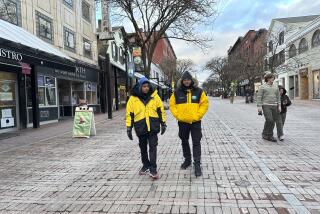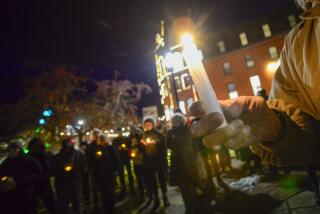N.H. Teen Killers Sentenced
- Share via
HAVERHILL, N.H. — Two teenage boys who killed Dartmouth College professors Half and Susanne Zantop received long prison sentences Thursday, ending a tragedy that had terrorized a calm campus community and, in its gruesomeness, startled a nation.
The hearing sent 18-year-old Robert Tulloch to prison for life, with no possibility of parole. James Parker, 17, will spend 25 years to life behind bars.
The proceeding in a small county courthouse here gave prosecutors their first opportunity to outline the grisly saga of a pair of high school students who grew restless with rural Vermont and struck out to make their fortunes by robbing and killing people.
In an emotional appearance before the court, the Zantops’ adult daughters also used the occasion to make their first public remarks about their parents’ brutal slayings.
“There’s no statement in the entire world that can capture the absolute horror, disbelief, pain, sadness and anger that my sister, my family and friends have experienced since the murders,” 29-year-old Veronika Zantop, a Seattle physician, told the court. As her voice quavered, her 27-year-old sister, Marianne, a human rights worker, gently stroked her back.
In their courtroom demeanor, the two defendants stood in dramatic contrast. Tulloch, reversing his initial plea of insanity, was steely. The tall, lanky teenager, a former student council president, stared straight ahead and declared himself guilty in the deaths of both acclaimed academics.
Parker shuddered with sobs after acknowledging his guilty plea in the killing of Susanne Zantop. Because his hands were manacled, he could not wipe the tears from his eyes.
“I’m sorry,” he finally stammered. “There’s not much more I can say than that. I’m just really sorry.”
Parker, who cast frequent frightened glances Thursday in the direction of his parents, provided key information that solved the nagging mystery of why two Vermont high school students would take the lives of two professors they had never met or even heard of. His sentence was reduced in exchange for his plea.
But it was Assistant State’s Atty. Kelly Ayotte who mesmerized the court as she outlined the plot two best friends hatched to murder for money, then trade the predictability of tiny Chelsea, Vt., for a life of adventure in Australia.
“They were bored in Chelsea,” Ayotte explained.
In painful and occasionally bizarre detail, Ayotte then told the story she would have presented had the case gone to trial.
The youths hoped to steal $10,000 to finance their new life, Ayotte said. They discussed identity theft, credit card fraud and even tried stealing an all-terrain vehicle. They were impatient; they wanted the money fast.
Tulloch, according to Parker’s statements, decided the pair should try assaulting people in order to steal their credit and bank cards. He decreed it best to kill the victims, so there would be no witnesses.
Dressed in black, Tulloch, the honor student, and Parker, the class clown, dug a hole in a field near a house in Vermont, planning to bury the owners after they made off with their cash. They were foiled when the owner came to the door carrying a gun.
Next they went to the Internet to purchase stun guns. But Tulloch’s mother found them and sent the guns back.
Again they went online to buy military-style knives. Their forays in their home state having failed, they came up with the idea that people in nearby Hanover, N.H., the idyllic home of Dartmouth, had plenty of money. So they strapped their weapons to their legs and set off for a village then that had seen just two murders in 50 years.
Time and again, the youths struck out. Then, posing as college students conducting an environmental survey, they knocked on the door of Half and Susanne Zantop.
The 62-year-old Earth sciences professor and his 55-year-old wife, who was chairwoman of Dartmouth’s German department, were “random victims,” Ayotte said Thursday.
After slitting their victims’ throats, Tulloch and Parker washed their hands and their knives in the snow. Then they went to a bookstore to read up on how people deal with killing, especially soldiers.
A guest invited for dinner found the Zantops dead in their cozy study.
Tulloch and Parker, meanwhile, realized they had left key evidence: the sheaths for their knives. They discussed their next step, Ayotte said, concluding they could kill a police officer if that became necessary.
Using $340 from Half Zantop’s wallet, they twice fled their hometown. They made it first to St. Louis before running out of nerve and returning to Chelsea, a hamlet of 1,300 about 25 miles from Hanover. Calling themselves Sam and Tyler, they escaped a second time, hitching rides with truckers. They were arrested three weeks after the killings in New Castle, Ind.
“It’s a house of cards,” Tulloch stated to authorities in Indiana. “It took me years to build, and I just blew it down.”
To his friend and partner in crime, he repeatedly said, “I’m sorry, Jim.”
In court Thursday, Tulloch made no such concession to contrition. His lawyers said he was pleading guilty against their advice. Offered the opportunity to address the court after receiving two concurrent sentences of life in prison without possibility of parole, Tulloch remained silent.
But he was forced to listen as Irene Kacandes, a professor of German at Dartmouth, recalled how her friends the Zantops helped everyone they met. Victims of their own good-heartedness, the Zantops freely opened their doors to strangers--including the two mock college students who took their lives.
“You had a choice on Jan. 27, 2001,” Kacandes admonished. “Susanne and Half Zantop did not.”
Indeed, Veronika Zantop explained that her German-born father’s name translated to “help” and that he made it his mission to live up to that name.
Outside the courtroom, Harry Beskind, a psychiatrist in Hanover, said he attended Thursday’s proceedings to “bear witness” to his friends’ deaths.
“We like to try to explain everything, whether the explanations are true or not,” Beskind said. “We all have these fancy theories, but I don’t think they’re worth very much in a case like this.”
Along with two beloved academics, a sense of innocence that permeated the Dartmouth community was lost on Jan. 27, 2001, Beskind said. “Hanover was a piece of America that was apart from the overall reality,” he said, noting that many residents seldom locked doors before the Zantops were killed. Now, he said, a feeling of “shock, dismay and impotent rage” hovers over the city.
Leaving the courtroom, Tulloch’s family was as taciturn as the young man who will now spend his life behind bars. James Parker’s parents, however, paused briefly to speak to a small crowd gathered outside the courthouse.
“We hope that over time,” Joan Parker said, “those hurt by these acts will be able to find peace in their hearts, and forgiveness.”
More to Read
Sign up for Essential California
The most important California stories and recommendations in your inbox every morning.
You may occasionally receive promotional content from the Los Angeles Times.












